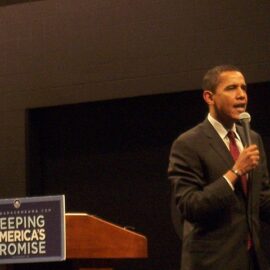

This article is an excerpt from the Shortform book guide to "The White Man's Burden" by William Easterly. Shortform has the world's best summaries and analyses of books you should be reading.
Like this article? Sign up for a free trial here .
Why shouldn’t the West try to impose free-market reforms on developing countries? What problems can this inflict upon the locals?
Free-market capitalism can lead to economic growth, but that doesn’t mean that it should be forced upon developing nations that aren’t ready for such reform. When more developed countries try to impose their will upon other nations, it usually does more harm than good.
Keep reading to learn what economist William Easterly has to say about this topic of controversy.
Free-Market Capitalism
Easterly writes that free-market capitalism can be a powerful force that drives economic growth, stimulates the development of a robust civil society, and serves as a foundation for a democratic society. However, Easterly also argues that the broader social and cultural conditions that enable the development of a free-enterprise system must arise organically within a community—and that these conditions are all too often ignored by Western governments or Western-dominated NGOs when they attempt to impose free-market capitalism on emerging economies.
According to Easterly, nearly every attempt to impose free enterprise anywhere in the world has led to decidedly poor results, largely because the development community ignores or fails to understand precisely what makes capitalism viable.
The Virtues of Markets
Easterly notes that the freedom to produce, buy, and sell what we want gives people a strong incentive to develop specialized skills that they can exchange in the market for the things they can’t directly produce themselves.
Further, voluntary exchanges make everyone better off because they rationally allocate scarce resources and enable people to make their own choices about which goods and services they’d like to consume (and how much), without the heavy hand of central planners or bureaucrats—who are often corrupt or incompetent—making these decisions for them.
Easterly writes that capital markets—when they’re transparent and well-functioning—are highly efficient at directing investment toward its best, highest-return uses, while also providing credit to those looking to borrow and invest. In short, Easterly argues, markets are a highly effective bottom-up system for solving problems because they get resources to the people who need them.
| Political and Economic Freedom In Capitalism and Freedom, Milton Friedman argues that economic freedom is an essential component of total freedom—the ability of an individual to pursue her own happiness and fulfillment without any external impediments, provided that she does not infringe on the freedom of others. Friedman writes that a society cannot have political freedom without the ability of individual buyers and sellers in a marketplace to engage in voluntary transactions that satisfy their needs. In fact, according to Friedman, there has never been a successful example of a society that combined state control of the economy (in the form of socialism or communism) with political liberty. Political power is dangerous, because it can be easily concentrated and centralized in the hands of the few. Economic power, however, works differently. In a well-functioning capitalist society, millions of individual buyers and sellers make decisions about which goods and services they require to satisfy their needs—with buyers free to choose their sellers, sellers to choose their buyers, and workers to choose their employers. Thus, argues Friedman, a great deal of power over a crucial area of day-to-day life is taken away from the hands of the few, and placed into the hands of the many. Free markets are inherently decentralized in nature, thus maximizing individual freedom and choice. In a capitalist society, economic power acts as a check on the power of political authorities because it is not in the hands of the government. |
Why Markets Can’t Be Imposed
However, writes Easterly, a free-market system cannot be imposed on a society that lacks the preconditions for it to function properly.
According to Easterly, markets don’t simply exist in a vacuum. Among other things, markets need a well-developed civil society, functional government, a legal system that respects private property rights and is based in the rule of law, and adequate regulation to ensure that goods are safe and reliable.
Perhaps most importantly, markets require a high degree of social trust among strangers in order to foster an economy based on voluntary transactions—trust is the only way customers know they won’t be ripped off, that what’s being sold is genuine, and that people will honor debts and pay for goods they’ve ordered. These values are deeply rooted in local culture and experience, and they can’t be imposed by an outside force.
It’s impossible to simply replicate a Western-style legal, judicial, and property ownership system in a country that is culturally unfamiliar with such institutions and expect them to work well.
| Culture Change and Free-Market Reform Cultures develop organically in communities of people—whether that community is an organization, a small town, or an entire nation—over long periods of time, without central planning or direction. When it’s entrenched, culture becomes something that most people don’t even consciously think about—rather, it is just the “natural” and “normal” way of doing things within that community. As a result, it is difficult to transform a culture through some sort of top-down initiative, especially if that initiative is being led by someone from outside the community (as, Easterly points out, is nearly always the case when it comes to foreign aid). For example, in a culture based on collective subsistence farming or hunting, people will likely be highly skeptical and apprehensive about moving toward a free-enterprise system in which they individually produce goods or sell their labor in a market and then use the proceeds for their own personal consumption. Some commentators argue that cultural change can only happen when small victories change an organization or society’s collective understanding of what’s possible. These incremental successes inspire confidence among people that they can do more. Thus, as we’ve seen Easterly argue, big, complex plans to “change the culture” are almost always doomed to failure. Instead, most experts write that culture change starts by addressing the most pressing challenges. For instance, if the larger problem is a lack of free markets in a society, an incremental step might be giving entrepreneurs in select communities small grants to open up tiny independent businesses, or setting up local fairs or flea markets where people can begin to learn the basics of a free exchange system. Once these immediate challenges are successfully overcome, more ambitious goals can be attempted. |

———End of Preview———
Like what you just read? Read the rest of the world's best book summary and analysis of William Easterly's "The White Man's Burden" at Shortform .
Here's what you'll find in our full The White Man's Burden summary :
- How the global humanitarian aid system is fundamentally flawed
- Why bottom-up aid models work much better than top-down models
- Why the West can't change bad governments






